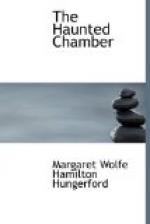“Well, let us go,” agrees Florence resignedly.
So together they all start once more for the old tower. As they reach the stone steps Sir Adrian says laughingly to Lady Laughton:
“Now, what do you expect to see? A ghost—a phantom? And in what shape, what guise?”
“A skeleton,” answers Lady Laughton, returning his laugh; and with the words the door is pushed open, and they enter the room en masse.
The sunlight is stealing in through the narrow window holes and faintly lighting up the dismal room.
What is that in yonder corner, the very corner where Sir Adrian’s almost lifeless body had been found? Is this a trick, a delusion of the brain? What is this thing huddled together, lying in a heap—a ghastly, ragged, filthy heap, before their terrified eyes? And why does this charnel-house smell infect their nostrils? They stagger. Even the strong men grow pale and faint, for there, before them, gaunt, awful, unmistakable, lies a skeleton!
Lady Laughton’s jesting words have come true—a fleshless corpse indeed meets their stricken gaze!
Sir Adrian, having hurriedly asked one of the men of the party to remove Lady Dynecourt and her friends, he and Captain Ringwood proceed to examine the grewsome body that lies upon the floor; yet, though they profess to each other total ignorance of what it can be, there is in their hearts a miserable certainty that appalls them. Is this to be the end of the mystery? Truly had spoken Ethel Ringwood when she had alluded to Arthur Dynecourt as being “out of their world,” for it is his remains they are bending over, as a few letters lying scattered about testify only too plainly.
Caught in the living grave he had destined for his cousin was Arthur Dynecourt on the night of Sir Adrian’s release. The lamp had dropped from his hand in the first horror of his discovery that his victim had escaped him. Then followed the closing of the fatal lock and his insensibility.
On recovering from his swoon, he had no doubt endured a hundred-fold more tortures than had the innocent Sir Adrian, as his conscience must have been unceasingly racking and tearing him.
And not too soon either could the miserable end have come. Every pang he had designed for his victim was his. Not one was spared! Cold and hunger and the raging fever of thirst were his, and withal a hopelessness more intolerable than aught else—a hopelessness that must have grown in strength as the interminable days went by.
And then came death—an awful lingering death, whilst the loathsome rats had finished the work which starvation and death had begun, and now all that remained of Arthur Dynecourt was a heap of bones!
They hush the matter up well as they can, but it is many days before Florence or her husband, or any of their guests, forget the dreadful hour in which they discovered the unsightly remains of him who had been overtaken by a just and stern retribution.




